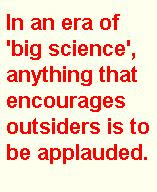 A new year (and to many, a new millennium) finds Babbage, appropriately, writing a few steps from The Time Machine, a West Country museum which has shed its dusty name and image. As Babbage watches young visitors exclaim in wonder over exhibits which would have bored them in the old Woodspring Museum, his initial disapproval has turned to enthusiasm. In an era of forbidding 'big science', anything that draws enquiring outsiders is to be applauded.
A new year (and to many, a new millennium) finds Babbage, appropriately, writing a few steps from The Time Machine, a West Country museum which has shed its dusty name and image. As Babbage watches young visitors exclaim in wonder over exhibits which would have bored them in the old Woodspring Museum, his initial disapproval has turned to enthusiasm. In an era of forbidding 'big science', anything that draws enquiring outsiders is to be applauded.One such outsider was Mr John Harrison, inventor of another time machine, the nautical chronometer. Having read "Longitude", Ms Dava Sobel's best-selling book, Babbage felt a great kinship with Harrison, who also struggled a lifetime with a nascent machine and a government funding body. The focus of the scientific establishment has shifted: private wealth in Harrison's time; government dominance in Babbage's; and multinational corporations nowadays. The move has been inexorably away from the individual contributor into large and lavishly funded corporate teams.
 But predictions of the demise of amateur and other individual scientists seem premature. As the flood of scientific data swells, massive funding of corporate science, inadvertently, feeds the individual worker. The future now seems to hold, Babbage feels, not survival of the big at the expense of the little, but continuation of an old symbiosis.
But predictions of the demise of amateur and other individual scientists seem premature. As the flood of scientific data swells, massive funding of corporate science, inadvertently, feeds the individual worker. The future now seems to hold, Babbage feels, not survival of the big at the expense of the little, but continuation of an old symbiosis.
For instance, Babbage just read of globally distributed seismic data gathering, and of a network of four supercomputers, 10,000 miles wide (perhaps the precursor of a Global Analytical Engine). These, the 'particle accelerators' of information science, require investment and cooperation only deliverable by corporate resources.
Nevertheless, there are simultaneous moves toward dissemination of Petabyte-level data sets, and the accessibility of huge reservoirs of reusable data through standard XML-based office software. Much of this data is, or will be, publicly visible - restricting access is becoming less cost-effective than transparency - and much of its potential is waiting for any questing mind which happens upon it.
Young scientists, now being surprised into intellectual curiosity by The Time Machine and its relatives, will turn to the Web, where they will find themselves in a sea of new data, barely charted, awaiting their exploration. Big science will get bigger, but the immediate future of the individual seems secure. Even as Babbage retrieves his teacup, spilt by delighted youngsters running from Mammoths to Marconi, he finds this thought both exciting and comforting.